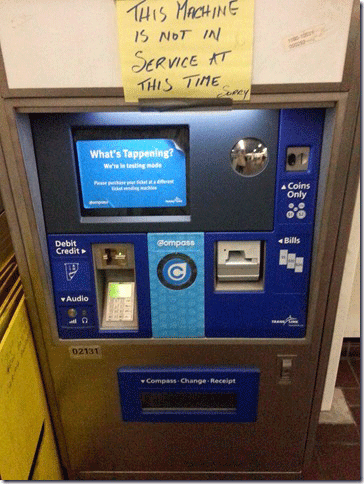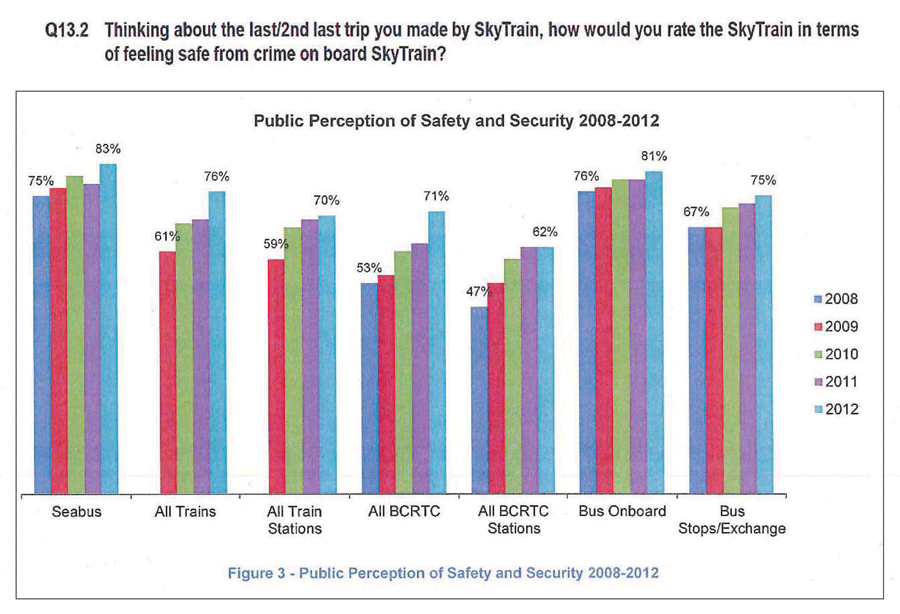(March 16, 2014)
Last time, I showed how and why B.C.’s ducal…er, provincial government went medieval on TransLink, Greater Vancouver’s public transit authority. The elected governing board stood for public accountability and fiscal prudence, so in late 2007 Transportation Minister Kevin Falcon legislated it out of existence for twice refusing to sign off on a grandiose project. In its place was put a board of nine like-minded, pro-business appointees who could be trusted not to think critically or put political considerations ahead of economic determinism. To all intents and purposes, TransLink had become a de facto agency of the government with unfettered power to borrow and spend money beyond the supervision of the legislature or the auditor general. Soon, the full effect of Falcon’s harebrained medievalism will be inflicted on the transit-riding public. TransLink will eventually unveil a new Faregate system for which riders will have to use electronic smart cards (Compass Cards) to ride public transit, especially on SkyTrain. Initially budgeted at $171 million (of which $70 million came from the federal and provincial governments) the cost has so far risen to $194.2 million, but the real question is why so much public money had to be spent to replace a paper-based fare system that already worked fairly well. As we will see, the Faregate/Compass Card system is a boondoggle of mind boggling expense and stupidity. The Security Justification The last line in the first paragraph is clearly nonsensical. It’s a non sequitur: a type of faulty reasoning where one statement is logically unrelated to anything said before it. We can agree that monitoring people closely in a free society is difficult, but the absence of monitoring does not imply criminal activity. By the government’s (Falcon’s) reasoning, a “fully accessible and ungated” public park is susceptible to criminal activity because people’s movements aren’t rigidly monitored. In other words, the security threat presented by the government is empty rhetoric. Even if safety were an issue, Falcon offered no proof that a gated system would make any difference. In fact, safety is not an issue, at least not as far as riders are concerned. On March 1, 2013, the transit police issued The Five-Year Trend Report 2008–2012, in response to a freedom of information request, The report, among other things, evaluated transit safety:
The following graph, taken from pages 8 of the report, refutes any notion that security was a major concern.
The Revenue Justification
First, the causal link between increased security and reduced fare evasion is another non sequitur. Second, Falcon’s claim about the underestimation of lost revenue is unsupported. Since TransLink had just been made a government fiefdom beyond the reach of legislative accountability, Falcon’s second-guessing of TransLink appears gratuitous and cannot be taken at face value. Nevertheless, the claim that Faregate will recoup lost revenue deserves to be assessed. To begin with, official TransLink estimates of annual underpayment of SkyTrain fares seem to be deliberately vague. In 24hrs Vancouver on Oct. 10, 2013, TransLink gave a broad range of $7 million to $10 million, but the 2011 figure was right near the low end, $7.7 million. Bearing that figure in mind, TransLink Vice-President Bob Paddon said the long-term annual operating costs of the Faregate system would be $12 million, which will go to Cubic, the U.S.-based contractor. The net revenue effect of the Faregate/Compass Card program, therefore, will not “greatly boost revenue for TransLink,” as Falcon claimed, but nearly double the amount of money lost, and that assumes the underpayments will stop. That last point invites questions about the system’s usefulness. A loophole was discovered last year whereby a rider could “tap in” at one station or on one bus and immediately “tap out,” thereby avoiding paying a multiple-zone fare. TransLink claimed that it had been aware that this problem might arise, but that raises further questions of why it came to light only after a beta-tester discovered it, and why TransLink didn’t do something about it earlier. Burnaby Mayor Derrick Corrigan gives the most likely explanation:
The argument that Faregate is the product of political capriciousness, not rational planning, is consistent with the behaviour of an autocrat and a compliant transit authority. There is no evidence that Falcon consulted the Transit Police about security or that he ordered a cost/benefit analysis before imposing Faregate on TransLink. Since neither of the government’s rationales has turned out to be defensible, the Faregate/Compass Card system serves no rational purpose and therefore must be considered an abuse of public funds. In the next part, we look at Translink and the way it justifies Faregate to the public.
|
|||||||||||

